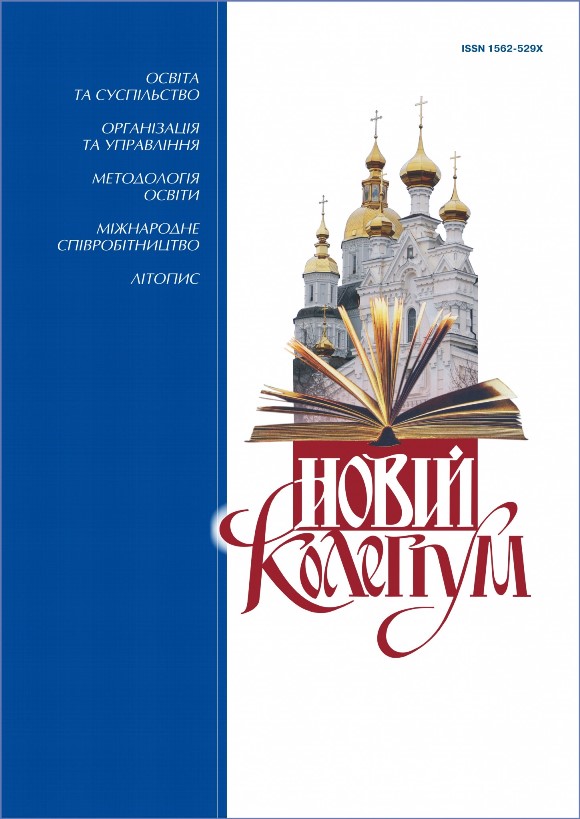To the question of formation of intercultural communicative competence in professional education
DOI:
https://doi.org/10.30837/nc.2022.1-2.91Keywords:
intercultural communication, competence, intercultural communicative competence, linguistic identityAbstract
Formation of intercultural communicative competence in a future specialist is an urgent problem of modern professional education. Problems of training graduates of higher educational institutions who are able to solve communicative and professional tasks in an international context are considered in the article from the position of competence-based approach. It is shown that intercultural communicative competence has an integrative nature and it is a complex interdisciplinary problem. The structure and components of intercultural communicative competence, its cultural and anthropological aspect, which is no less important than the linguistic one, are analyzed. It is substantiated that competence-based approach sets the goal for teaching foreign languages to form a linguistic personality capable of going beyond their own culture, but saving own cultural identity. The European experience in the formation of competencies that an applicant for education must master in order to be able to communicate productively in a foreign language in a broad social and professional context is analyzed. It is concluded that in order to form intercultural communicative competence among students of non-linguistic specialties, it is necessary to improve methods of teaching foreign language, to acquaint students with history, modern reality, culture, way of life, and style of behavior of the country which language is being studied. It is also advisable to include elective disciplines in the curricula such as basics of theory of intercultural communication, theory of discourse, theory of argumentation, etc.
References
Хуторской А.В. Компетентностный подход в обучении : науч.-метод. пособие. Москва : Эйдос ; Изд-во Ин-та образования человека, 2013. 73 с.
Закон України «ПроОсвіту» [Електронний ресурс]. URL: https://zakon.rada.gov.ua/laws/show/2145-19#Text
Методичні рекомендації щодо розроблення стандартів вищої освіти, затверджені МОН України у редакції від 30.04.2020 р. № 584 [Електронний ресурс]. URL https://mon.gov.ua/ua/npa/pro-unesennya-zmin-do-metodichnih-rekomendacij-shodo-rozroblennya-standartiv-vishoyi-osviti-1
Методичні рекомендації для розроблення профілів ступеневих програм, включаючи програмні компетентності та програмні результати навчання ; пер. з англ. національного експерта з реформування вищої освіти Програми Еразмус+, д-ра техн. наук, проф. Ю.М. Рашкевича. Київ : ТОВ «Поліграф плюс», 2016. 80 с.
Chomsky, Noam. Aspects of the Theory of Syntax. MIT Press, Cambridge, Massachusetts: MIT Press, 1965.
Елизарова Г.В. Культура и обучение иностранным языкам. СПб. : КАРО, 2005. 352 с.
Черняк Н. В. Межкультурная компетенция: история исследования, определение, модели и методы контроля: монография. Москва : ФЛИНТА, 2016. 264 с.
Byram M.S. Teaching and Assessing Intercultural Communicative Competence: Revisited. Bristol, United Kingdom: Multilingual Matters, 2020. 200 p.
Byram M.S. Questions of identity in foreign language learning // Striving for the Third Place: Intercultural Competence through Language Education / J.Lo Bianco, A.J. Liddicoat, C. Crozet (eds.). Melbourne : Language Australia, 1999. P. 91–103.
Верещагин Е. М., Костомаров В. Г. Язык и культура: Лингвострановедение в преподавании русского языка как иностранного. Москва : 1990. 246 с.
Гальскова Н.Д., Гез Н.И. Теория обучения иностранным языкам. Лингводидактика и методика. Москва : Изд. центр «Академия», 2006. 336 с.
Common European Framework of Reference: Learning, Teaching, Assessment. Cambridge University Press [Електронний ресурс]. URL: https://rm.coe.int/16802fc1bf
Загальноєвропейські Рекомендації з мовної освіти: вивчення; викладання, оцінювання : пер. О.М.Шерстюк ; наук. ред. укр. видання д-р пед. наук, проф. С.Ю.Ніколаєва. К. : Ленвіт, 2003. 273с.

